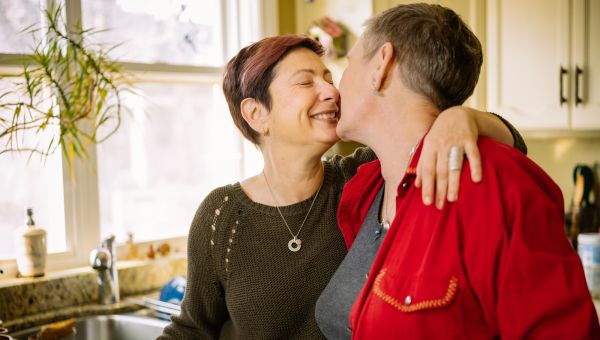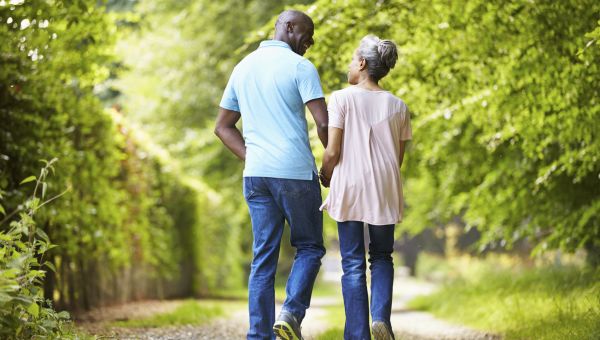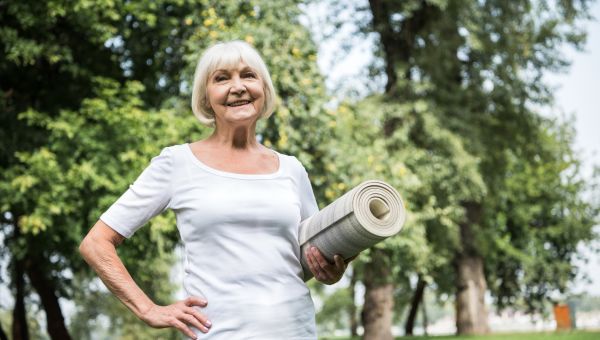How to have healthy, satisfying sex at any age
Expert tips for every decade of a woman’s life.
Updated on September 15, 2023

Satisfying sex can—and should—happen as you get older.
“A woman's best sex truly can happen at any time,” says Melissa Hague, MD, an OBGYN with Wesley Medical Center in Wichita, Kansas. “That applies as long as she feels confident in the person she is, is secure with her partner, and she’s comfortable physically.”
Whatever stage of life you’re in, here are expert-approved tips for having healthy, satisfying sex.

Set the right mood in your twenties
Studies suggest that human sexual arousal is determined by two systems. Everyone has both a sexual excitation system (SES) and a sexual inhibition system (SIS). The SES is like stepping on the accelerator pedal of a car, which helps you get turned on. The SIS is like stepping on the brake. In some people, one system is stronger than the other, which can help explain variations in people’s sexual response.
The SIS can become active if you’re worried about sexual performance or the potential physical and emotional risks of sex. This may lead you to stop feeling turned on or to not get turned on in the first place.
The way in which these systems work may help explain why some young women find it hard to feel comfortable sexually. For example, psychological stress—perhaps caused by thinking about past trauma or the possible consequences of sex, such as sexually transmitted infections (STIs) or unplanned pregnancy—can activate the SIS.
It may help to work on identifying and easing your stressors. For example, if you’re worried about STIs, speak with a healthcare provider (HCP) or visit a local clinic to get tested. If you’re concerned about pregnancy, there are an increasing array of birth control options.

Plan ahead in your early thirties
Among those people interested in starting families, more and more are waiting until their 30s or even their 40s to do so, according to Dr. Hague. Although this pacing may provide more time to establish careers or to spend time with a partner before having children, it may become more difficult to become pregnant the longer you wait.
“If you don’t want to have kids until your 40s or later, see a reproductive endocrinologist, or hormone doctor, in your 30s to learn about preserving your eggs for later use,” recommends Hague.
Also, if you’re a new 30-something parent, it’s worth noting that when you nurse a child, your body releases the hormone prolactin, which may cause your sex drive to fall. You will also have lower estrogen levels at this time, which may contribute to vaginal dryness. After weaning, your hormones will change again. In many cases, it simply takes time for the body to heal from the experience of childbirth. Many people find that their libido comes back.
Post-partum depression, which may affect as many as 1 in 7 women, has also been tied to low libido after birth. If you are experiencing intense feelings of sadness or a lack of connection to your baby, speak with a HCP about getting help. They may refer you to a mental health professional for further consultation.

Feel extra confident in your late thirties to forties
Cultural stereotypes and media representations may suggest that your 20s and 30s are your sexual heyday. In fact, evidence suggests that women in their 40s may experience orgasm more consistently than younger or older women.
A 2016 study published in Socioaffective Neuroscience & Psychology reported the results of six national surveys of Finnish adults conducted from 1971 to 2015, involving 6,155 women. It found that, in 2015, more than 60 percent of women aged 35 to 44 experienced orgasm every time they had sex. (The survey asked about penis-vaginal sex specifically.) In 1971, by comparison, just over 50 percent orgasmed each time they had sex.
The next-most orgasmic group? Women aged 45 to 54, just under half of whom reported having an orgasm each time they had sex.
“Your largest sexual organ is your brain,” says Hague. “A lot of women in their 40s are finally at a place where they’re comfortable with themselves.” Many also are better able to discuss sexual issues and what they like and don’t like, whether they are in long-term partnerships or not, she adds.

Stay pain-free in your fifties
On average, women in the United States start menopause around age 51. While menopause means relief from menstrual periods, it may also contribute to newfound difficulties with sex. For example, between 17 percent and 45 percent of postmenopausal women report pain with intercourse.
“If sex starts to hurt from vaginal itching or dryness, don’t wait until you can’t tolerate it anymore. Get help when the pain starts or it becomes harder to climax,” says Hague. To find an HCP specializing in sexual health, Hague recommends checking with the International Society for the Study of Women’s Sexual Health.
Don’t let dryness keep you from enjoying sex during menopause. For temporary relief, talk to an HCP about trying vaginal moisturizers, lubricants, or estrogen cream.

Stay fit in your sixties
In your 60s, conditions like heart disease and diabetes that affect your circulation can prevent arousal. Stiff joints may also make your favorite positions more difficult.
Getting more physical activity can help. Start with walking, which improves circulation and supports healthy joints. Thirty minutes of walking a day also lowers your risk of:
- Arthritis
- Stroke
- Depression
Sex, exercise, and overall health go hand-in-hand: “Couples who have sex regularly are not only healthier in their relationship, they also tend to be healthier physically and more active,” Hague says.

Practice safer sex in your seventies
For many 70-somethings who no longer work full-time or have responsibilities to children or parents, the extra free time and privacy can make for an active sex life. According to the National Poll on Healthy Aging, published in 2018, 40 percent of people in the U.S. ages 65 to 80 are sexually active.
Remember that at any age it’s important to practice safe sex. Rates of STIs, including gonorrhea, chlamydia, herpes, and syphilis, have been rising among older adults. Many older people—some of whom may be single or newly dating again—underestimate their risk. HCPs, meanwhile, often don’t discuss STIs or even general sexual habits with their older patients.
“Even though you can’t get pregnant, condoms are always recommended if you or your partner are having sex with multiple partners,” says Hague. “You’re still at risk for STIs like HIV and herpes.”
If you or your partner have another partner (or your partners have other partners), consider getting routine HIV screenings and regular STI checks. Most clinics offer simple 20-minute HIV screenings that don’t require a needle stick, just a finger prick or a mouth swab.

Staying Sexually Active In Your Eighties and Beyond
Since women often outlive men, women in their 80s and 90s may have a harder time finding sexual partners. If you’re looking to meet new people, here a few tips that may help:
- Socialize: Join an exercise group or sign up for activities at your local community center. You might find romance, plus older adults with strong social networks have been found to live longer.
- Volunteer: Helping with a cause you’re passionate about can lead you to like-minded people. Evidence also suggests that some older adults who volunteer experience less depression and lower blood pressure.
- Hit the books: Sign up for continuing education classes in your area. You could pursue a life-long academic interest and schedule “study sessions” with someone from class.
There’s also no rule that you need a partner to experience sexual satisfaction. At any age, masturbation provides a way to get to know your body and to learn and enjoy what you like best.

Kinsey Institute. The Dual Control Model of Sexual Response. Accessed March 17, 2022.
Bancroft J, Graham CA, Janssen E, Sanders SA. The dual control model: current status and future directions. J Sex Res. 2009;46(2-3):121-142.
Cecilia M. Ford. The New Normal: Sex Educator Emily Nagoski Explains That It’s All Good (Part One). May 12, 2016.
Fleming, John. Gallup Analysis: Millennials, Marriage and Family. May 19, 2016.
Curtin SC, Sutton PD. Marriage rates in the United States, 1900–2018. NCHS Health E-Stat. 2020.
Kim Parker and Renee Stepler. As U.S. marriage rate hovers at 50%, education gap in marital status widens. September 14, 2017.
Polomeno V. Sex and Breastfeeding: An Educational Perspective. J Perinat Educ. 1999;8(1):30-40.
La Leche League International. Breastfeeding and Sex. February 2018.
Rowland M, Foxcroft L, Hopman WM, Patel R. Breastfeeding and sexuality immediately post partum. Can Fam Physician. 2005;51(10):1366-1367.
NCT. 1st 1,000 Days New Parent Support. Breastfeeding and sex: five surprising facts. Last reviewed April 2018.
Morof D, Barrett G, Peacock J, Victor CR, Manyonda I. Postnatal depression and sexual health after childbirth. Obstet Gynecol. 2003;102(6):1318-1325.
Kontula O, Miettinen A. Determinants of female sexual orgasms. Socioaffect Neurosci Psychol. 2016;6:31624. Published 2016 Oct 25.
Mayo Clinic. Menopause. October 14, 2020.
Mayo Clinic. Vaginal dryness after menopause: How to treat it? July 11, 2020.
North American Menopause Society. Pain with Penetration. Accessed March 17, 2022.
Arthritis Foundation. 12 Benefits of Walking. Accessed March 17, 2022.
Centers for Disease Control and Prevention. Benefits of Physical Activity. Page last reviewed November 1, 2021.
University of Manchester. Love and intimacy in later life: study reveals active sex lives of over-70s. January 28, 2015.
Lee DM, Nazroo J, O'Connor DB, Blake M, Pendleton N. Sexual Health and Well-being Among Older Men and Women in England: Findings from the English Longitudinal Study of Ageing. Arch Sex Behav. 2016;45(1):133-144.
Holly Cooper Ford. UVA Health. Sex After 60: STD Rates Booming for Boomers. April 11, 2019.
Patricia Scanlon. The Well by Northwell. After Decades of Decline, STD Rates are Rising. February 14, 2020.
ACRIA and the New York State Office for the Aging (NYSOFA). Older Adults and Sexual Health: A Guide for Aging Services Providers. Updated September 2020.
Thornton J. WHO report shows that women outlive men worldwide. BMJ 2019; 365 :l1631.
Trudel-Fitzgerald C, Zevon ES, Kawachi I, Tucker-Seeley RD, Grodstein F, Kubzansky LD. The Prospective Association of Social Integration With Life Span and Exceptional Longevity in Women. J Gerontol B Psychol Sci Soc Sci. 2020;75(10):2132-2141.
Sneed, R. S., & Cohen, S. (2013). A prospective study of volunteerism and hypertension risk in older adults. Psychology and Aging, 28(2), 578–586.
Aonuma R, Mayers T, Mizukami K, Aonuma K, Matsuda H. Factors Associated with Volunteer Activities and Sleep Efficiency in Older Adults with Hypertension: A Sequential Model Study. Geriatrics (Basel). 2021;6(3):89. Published 2021 Sep 11.
Kontula O, Miettinen A. Determinants of female sexual orgasms. Socioaffect Neurosci Psychol. 2016;6:31624. Published 2016 Oct 25.
Gavin, Kara. Sex After 65: Poll Finds Gender Differences, Lack of Communication. Michigan Medicine. May 3, 2018.
Stentagg M, Skär L, Berglund JS, Lindberg T. Cross-Sectional Study of Sexual Activity and Satisfaction Among Older Adult's ≥60 Years of Age. Sex Med. 2021;9(2):100316.
National Institute on Aging. Sexuality and Intimacy in Older Adults. Content reviewed: April 18, 2022.
Bhatia R, Hirsch C, Arnold AM, Newman AB, Mukamal KJ. Social networks, social support, and life expectancy in older adults: the Cardiovascular Health Study. Arch Gerontol Geriatr. 2023;111:104981.
Mayo Clinic Health System. Helping people, changing lives: 3 health benefits of volunteering. August 1, 2023.
Kimberly J Jennings, Luis de Lecea, Neural and Hormonal Control of Sexual Behavior, Endocrinology, Volume 161, Issue 10, October 2020.
More On


video

article

slideshow


video


video
